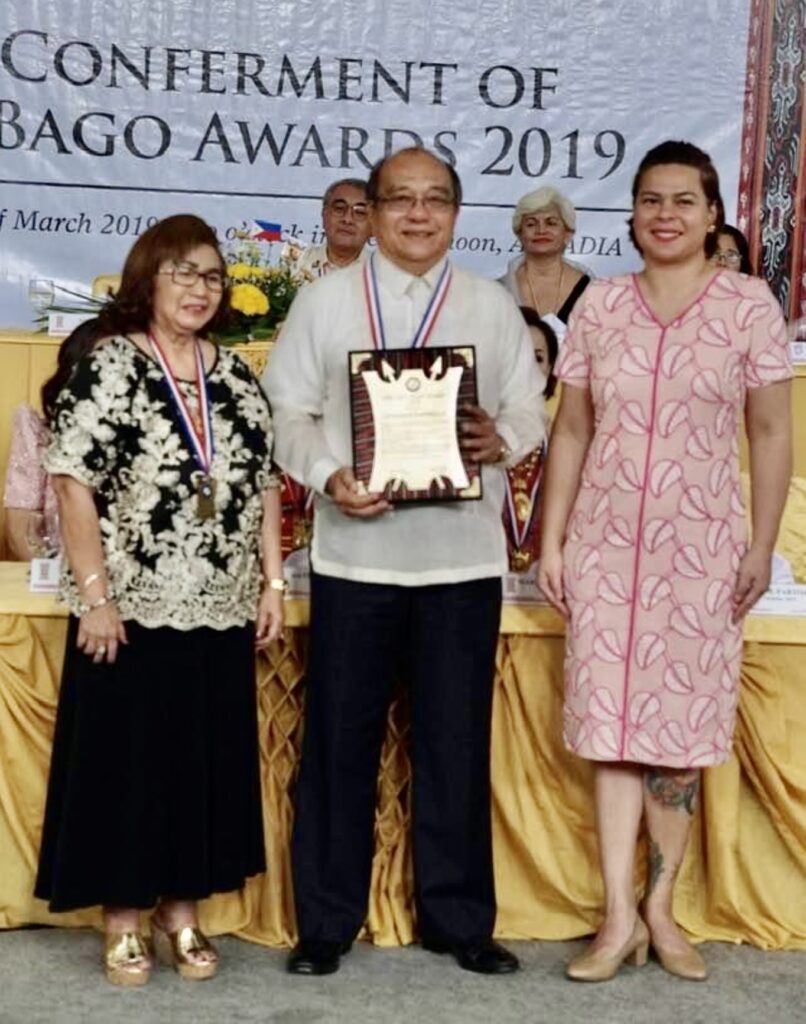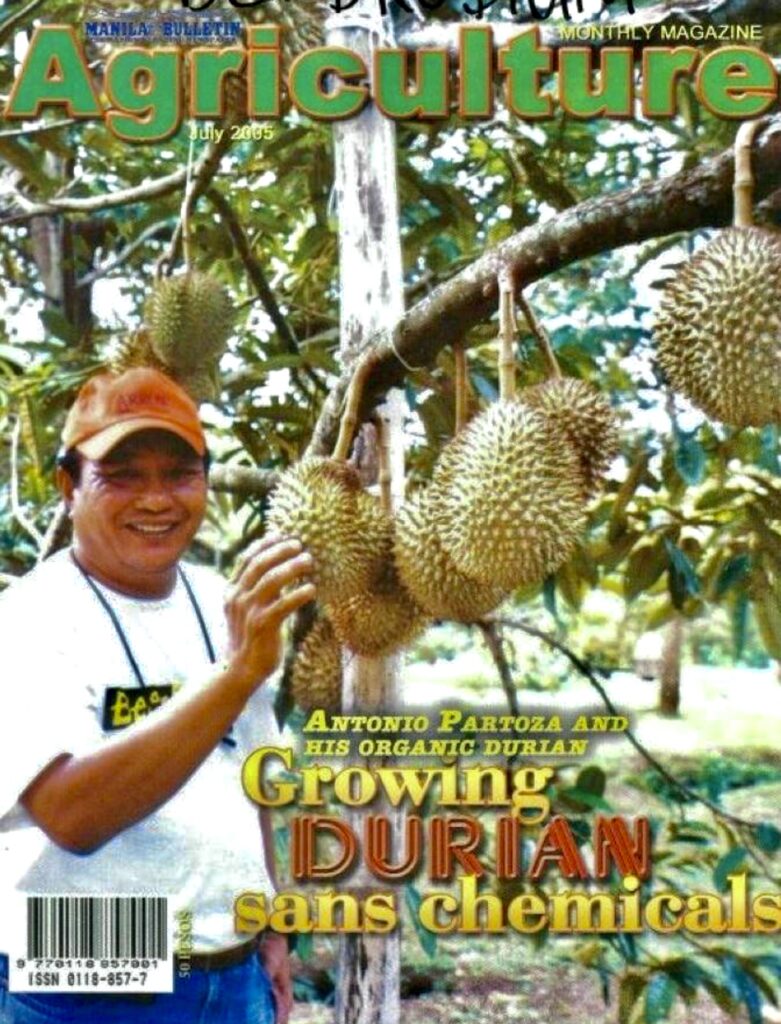Text by Henrylito D. Tacio
Photos courtesy of Atty. Antonio B. Partoza, Jr.
Make way for the most exotic – if not controversial! – fruit found in this part of the country: durian (known in the science world as Durio zibethinus).
“Durian has an excellent taste that its flavor surpasses all the other fruits in the world,” old traveler Linchott, writing in 1599, commented. Dr. Paladanus, a world-renowned historian, added: “This fruit is of a hot and humid nature. It smells like rotten onion, but once tasted, everybody will like it.”
Now, if there’s a man from Davao associated with durian, it’s none other than Atty. Antonio B. Partoza, Jr. In fact, he appeared on the cover of the prestigious Agriculture Magazine, which was edited at that time by no less than Zac Sarian, a recipient of the Ramon Magsaysay Award (touted to be the Nobel Prize of Asia).
Partoza never thought the fruit that smells like hell but tastes like heaven will bring him some clout and prestige when he ventured into durian farming in 1987. Being the fruit basket of the Philippines, he thought of durian – particularly the “arancillo” variety – as a way of promoting Davao into the world.
“His perseverance to showcase Davao’s pride through the continued production of homegrown Durian has gained the recognition of the agricultural industry,” a dossier said.
Aside from Agriculture magazine, he was also featured in various local and national papers and even the in-flight magazine of Singapore’s SilkAir.
As the Partoza Durian Farm became a byword among durian connoisseurs of Davao City, he also became the toast of television. He was featured in TV programs such as Living Asia and Balitang Europe.
What makes his durian fruits unique is that they are taken from trees that are grown organically. As one of the pioneering advocates of natural farming, he uses indigenous materials from the farm as fertilizer instead of relying on expensive commercial chemical fertilizer. The success of his venture made him earn the sobriquet, Durian King of Davao.
Being a farmer and entrepreneur, Partoza gets involved in some organizations. He was elected as president of Mindanao Fruit Industry Development Council, which he served for 12 years. During his leadership, several conferences on transferring technologies to farmers and market-matching activities for farmers in different provinces in Mindanao were conducted.
As the durian farm became more popular, he and his equally hardworking wife Nelia established Annipie Bakery Café at the entrance of Nova Tierra Subdivision in Lanang. (Later on, they established another branch in Tagum City.)
Today, Annipie – with the “Cinnamon Destination Tagline” – has become one of the more frequented coffee shops in Davao City, with several branches located on Quimpo Boulevard, Malvar Extension, and some selected malls.
Actually, Partoza is not a Dabawenyo by birth; he is originally from Pagadian City. He came to Davao in 1973 as a young bachelor and neophyte licensed attorney-at-law. It wasn’t until he met and tied the nuptial knot with the former Nelia Domingo that he decided to settle in Davao City. (The union is blessed with four children, who are all based in Davao and currently handling their own businesses.)
Partoza started his law career as assistant city legal officer in 1976. After four years of service, he decided to venture into newspaper distribution in 1983. Later on, he expanded its network that stretched through 8 provinces in Mindanao amidst the uncertainties caused by Martial Law.
Partoza was 37 years old when he started farming. This was in 1984 when he bought 9-hectare land in barangay Biao Escuela in Tugbok District. Later on, he secured another 15 hectares in Panabo City. These farms are now planted with coconut, durian, jackfruits, banana, and agarwood.
Instead of planting the export-oriented banana, he planted the cardava variety. This triploid hybrid banana cultivar originated from the Philippines and is primarily used for cooking although it can also be eaten raw.
Agarwood is the most recent addition to his farm. Contrary to common notion, agarwood growing is allowed but “highly regulated,” according to the Department of Environment and Natural Resources (DENR). What is prohibited is collecting its seeds directly in the wild.
“Before engaging in this highly regulated lucrative endeavor, interested individuals and private firms are advised to secure all the necessary permits from DENR,” explained then environment secretary Roy A. Cimatu. “We must ensure that the source of planting materials is legal and that the propagation of this species is in accordance with the existing rules and regulations.”


When Partoza started farming, one of the biggest problems he had was securing good planting materials. Another dilemma he had was visiting his farm to know if the crops he planted were faring well. “It used to be very dangerous going there because of the New People’s Army,” he admitted.
In 1987, after the EDSA People Power Revolution, he planted the controversial fruit, durian. “I love durian and wanted something innovative,” he replied when asked why he grew durian in his farm.
He got his durian planting materials from a friend who’s a propagator, the Alcon Farms in barangay Los Amigos. He planted 100 durians per hectare at a distance of 10 meters. Like most farmers, he encountered several diseases like phytophthora, which can be remedied through good agricultural practices.
Because the durians he planted were grafted, they bore fruits five years after planting. In the first year, there were few fruits. But in later years, the fruits he harvested became plentiful but the profuse production “depends on the weather.”
Aside from arancillo, he also plants other varieties like Puyat, Musang king, Black thorn, and Puang Manee. In raising his crops, he gets information from reading magazines and books, watching YouTube clips, and attending seminars.
Partoza never has a problem selling his fruits because his customers come to his farm to buy them. “Kulang pa nga ang supply,” he said.
In cases there are leftovers, he freezes the fruits or processes them into candy tart or durian pie.
High price of inputs like fertilizers and pesticides are the current problems durian growers are facing right now, he said.
Hearing the news that the country is about to export durian to other countries, he said, “(It’s a) good idea but we have to produce volume, quality and standard varieties.”
Farming, he believed, is no bed of roses. “Farming is a thankless task,” Partoza pointed out, “and you have to love farming.”

